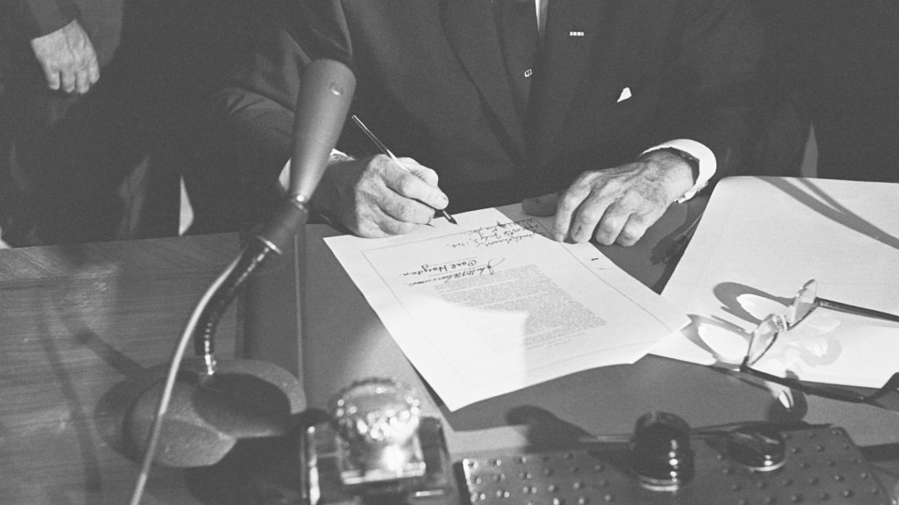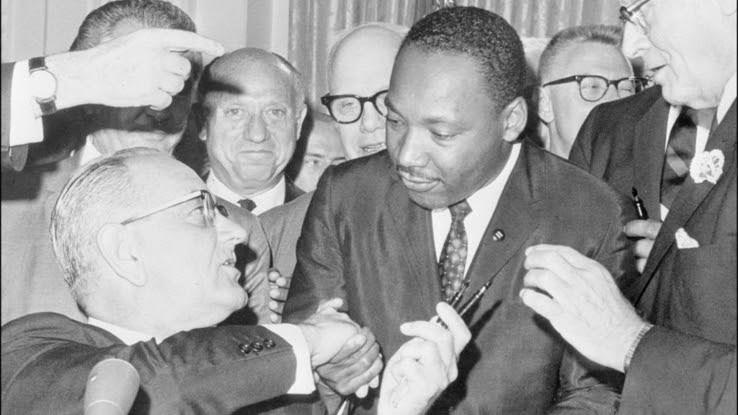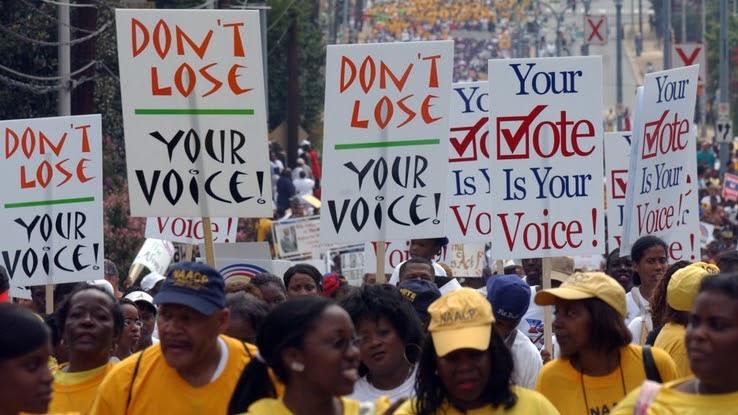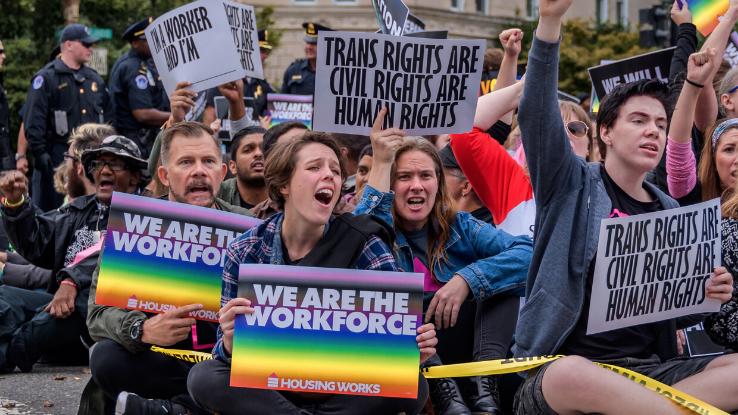Is 58 A Composite Number

The Civil Rights Deed of 1964 sought to finish much of the discrimination that was pervasive, and legal, in 1960s America. Title VII of the Ceremonious Rights Act specifically "bars employment discrimination based on race, organized religion, national origin and sex" — and it grants protection based on gender identity and sexual orientation.
Over 50 years later, the Civil Rights Deed continues to protect countless individuals regardless of their ethnicity, culture, or creed. To appreciate the full telescopic — and the lasting legacy — of the Ceremonious Rights Act of 1964, it'south of import to await back and understand what led up to its momentous enactment.
Who Signed the Civil Rights Act of 1964?
When the American Civil War concluded on April 8, 1865, the government passed the 13th, 14th and 15th Amendments to cancel slavery, grant formerly enslaved people U.S. citizenship and provide these new citizens the right to vote. All the same, in the decades that followed, numerous states, particularly those in the South, created untold "legal" obstructions, from literacy tests to grandfather clauses, to stop Black Americans from voting and exercising the rights that were codified in those amendments.

By the time President John F. Kennedy entered the White House in 1961, Black leaders similar Martin Luther Male monarch Jr., Rosa Parks and others made it clear that real change was needed to protect Blackness Americans and their rights. At first, President Kennedy avoided any steps to end segregation, but, by June of 1963, he outlined a civil rights bill that would non just finish segregation but also restore — and protect — Black Americans' right to vote. President Kennedy was tragically assassinated on November 11 of the aforementioned year, prompting his vice president and successor Lyndon B. Johnson to laissez passer the beak in his stead.
The Ceremonious Rights Act of 1964 as we know it today included numerous provisions: It banned voter registration requirements, similar literacy tests and poll taxes, and aimed to terminate discrimination and segregation in public schools, trade unions, institutions that did business organization with the federal authorities and businesses that participate in interstate commerce. Additionally, the human action too banned discrimination when it came to federal assistance program eligibility.

Opposition to the bill was fierce. Southern congressmen chosen information technology a violation of individual and land rights, and there were numerous attempts to sabotage the bill with and then-called "poison pill" amendments — additions to a law intended to plow other lawmakers against it. Ane such amendment was proposed by Congressman Howard W. Smith of Virginia. He opposed both segregation and women's rights but figured that, by introducing language into the bill banning discrimination based on sex equally well as race, color, organized religion and national origin, he could sink the pecker.
Much to Smith's chagrin, President Johnson and Congress were determined to laissez passer the pecker anyway, despite shakier back up for the language based on sex. While a grouping of senators held the longest filibuster in U.S. history — sixty days in total — to prevent the bill from becoming law, deals were fabricated backside the scenes to win over opponents, and the beak moved to Johnson'southward desk-bound. Martin Luther King Jr., who was in the room with the president when he signed the neb into law, described that moment every bit "a second emancipation."
What Happened in the Wake of the Act's Enactment?
Just considering the nib passed, that didn't mean all of the opposition suddenly vanished. In fact, in the wake of its enactment, the deed was brought all the way to the Supreme Court, where the justices confirmed information technology to be constitutional. As a event, white segregationists staged protests, committed acts of violence and voted a slew of pro-segregation lawmakers into office. Johnson, a Democrat, famously mused, "Information technology is an important gain, but I think we just delivered the Southward to the Republican Political party for a long time to come."

On the flip side, the law as well led to the passage of further landmark pieces of legislation, including the Voting Rights Act of 1965, which further strengthened protections against discriminatory voting laws, and the Fair Housing Human action of 1968, which made discrimination in selling, renting or buying property illegal. Eventually, the act itself was amended in order to extend protections to seniors and disabled Americans, and, under Title Nine, women* gained protection from discrimination based on sex activity in education programs or activities that receive federal financial assistance, including sports.
*At the time of the subpoena'due south addition, the aim was to put men and women on equal footing, simply, today, the Supreme Court'south reading of the Civil Rights Act seems more poised to protect folks of all genders.
What Is the Deed's Legacy Today?
On June 15, 2020, the Supreme Courtroom ruled on whether or not Title Vii protects LGBTQ+ workers from workplace discrimination. Thanks to the 6-three bulk ruling, Title VII'southward language now firmly applies to discrimination based on sexual orientation and gender identity. For the majority, Justice Neil M. Gorsuch wrote, "An employer who fires an individual simply for being gay or transgender defies the police force."

The ruling is a landmark for many reasons, simply chief amidst them is that this was the first major instance that outrightly protected transgender rights. Before, information technology was legal in more than than half of the states to burn workers for being gay, bisexual, transgender or queer. That is, even though gay marriage has been the police force of the land since 2015, LGBTQ+ folks in some states could become married over the weekend — and then fired on Mon, simply for living openly and truthfully with their same-sex spouse.
"This is a simple and profound victory for [LGBTQ+] civil rights," Columbia police force professor Suzanne B. Goldberg told The New York Times. "Many of us feared that the court was poised to gut sex discrimination protections and allow employers to discriminate based on sexual orientation and gender identity, yet it declined the federal government's invitation to take that damaging path."
Of class, despite these victories, the Civil Rights Act of 1964 hasn't fully reconciled inequality in America. As the murder of George Floyd and many other Black Americans at the hands of police has shown, people in the U.s.a. still get treated in fundamentally different ways based on skin colour. Additionally, inequality continues to stem from laws and practices that, in the past, expressly prevented Black Americans from owning property and advancing financially.
Additionally, the Civil Rights Human action itself has also been weakened by certain courtroom rulings, such as Shelby County v. Holder, wherein the court ruled that states and counties with a history of discriminatory voting laws no longer needed clearance from the federal government to change their voting laws. Needless to say, voter purges, stricter voter ID laws, rollbacks on early voting and registration and other forms of voter suppression emerged, making it harder for people of color to vote. Despite these shortcomings, withal, the Ceremonious Rights Act of 1964 has cemented its identify as a quintessential piece of legislation — one that aims to create a better life for all Americans, even if we still take quite a scrap of piece of work to exercise to brand that vision a reality.
Is 58 A Composite Number,
Source: https://www.reference.com/history/what-was-civil-rights-act-1964?utm_content=params%3Ao%3D740005%26ad%3DdirN%26qo%3DserpIndex&ueid=f517fe71-1a81-4205-93e1-c9820ab0437c
Posted by: thompsoncasse1945.blogspot.com


0 Response to "Is 58 A Composite Number"
Post a Comment